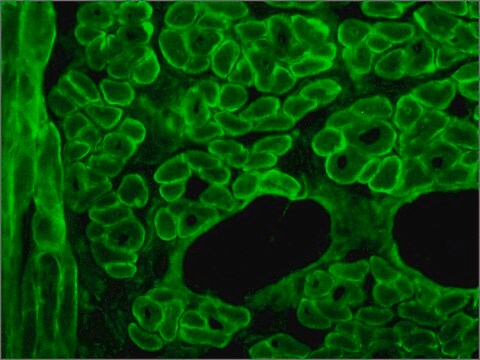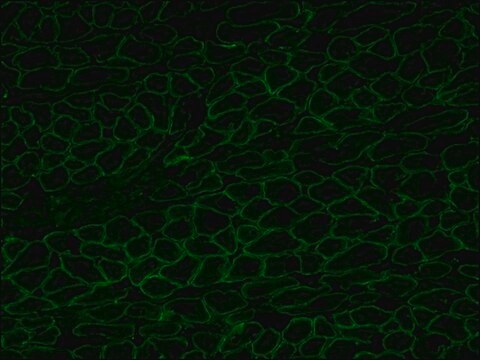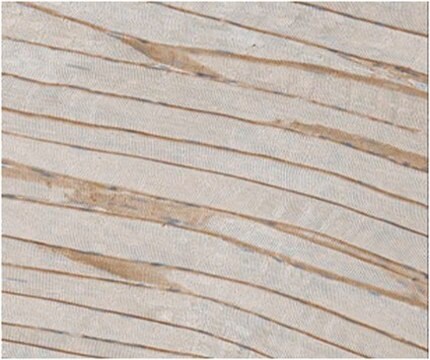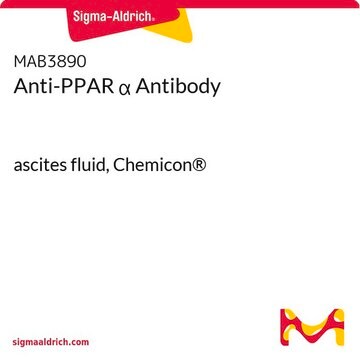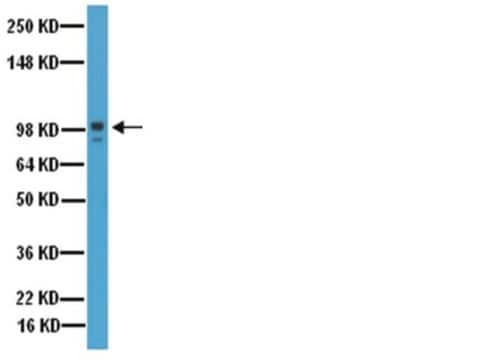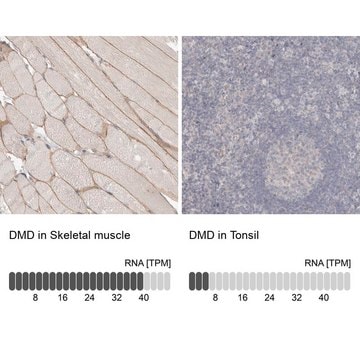Wichtige Dokumente
SAB4200763
Anti-Dystrophin Antibody

mouse monoclonal, MANDRA1
Synonym(e):
Anti-DMD
About This Item
Empfohlene Produkte
Produktbezeichnung
Anti-Dystrophin antibody, Mouse monoclonal, clone MANDRA1, purified from hybridoma cell culture
Biologische Quelle
mouse
Qualitätsniveau
Antikörperform
purified from hybridoma cell culture
Antikörper-Produkttyp
primary antibodies
Klon
MANDRA1, monoclonal
Form
buffered aqueous solution
Mol-Gew.
~427 kDa
Speziesreaktivität
zebrafish, rat, mouse, human
Erweiterte Validierung
independent
Learn more about Antibody Enhanced Validation
Konzentration
~1.0 mg/mL
Methode(n)
immunoblotting: suitable
immunofluorescence: suitable
immunohistochemistry: 10-20 μg/mL using acetone fixed rat tongue frozen sections
Isotyp
IgG1
UniProt-Hinterlegungsnummer
Versandbedingung
dry ice
Lagertemp.
−20°C
Posttranslationale Modifikation Target
unmodified
Angaben zum Gen
human ... DMD(1756)
Allgemeine Beschreibung
Spezifität
Anwendung
- immunohistochemistry
- immunoblotting
- immunofluorescence
- enzyme-linked immunosorbent assay (ELISA)
Biochem./physiol. Wirkung
Physikalische Form
Lagerung und Haltbarkeit
Haftungsausschluss
Sie haben nicht das passende Produkt gefunden?
Probieren Sie unser Produkt-Auswahlhilfe. aus.
Empfehlung
Lagerklassenschlüssel
10 - Combustible liquids
Flammpunkt (°F)
Not applicable
Flammpunkt (°C)
Not applicable
Hier finden Sie alle aktuellen Versionen:
Analysenzertifikate (COA)
Die passende Version wird nicht angezeigt?
Wenn Sie eine bestimmte Version benötigen, können Sie anhand der Lot- oder Chargennummer nach einem spezifischen Zertifikat suchen.
Besitzen Sie dieses Produkt bereits?
In der Dokumentenbibliothek finden Sie die Dokumentation zu den Produkten, die Sie kürzlich erworben haben.
Unser Team von Wissenschaftlern verfügt über Erfahrung in allen Forschungsbereichen einschließlich Life Science, Materialwissenschaften, chemischer Synthese, Chromatographie, Analytik und vielen mehr..
Setzen Sie sich mit dem technischen Dienst in Verbindung.